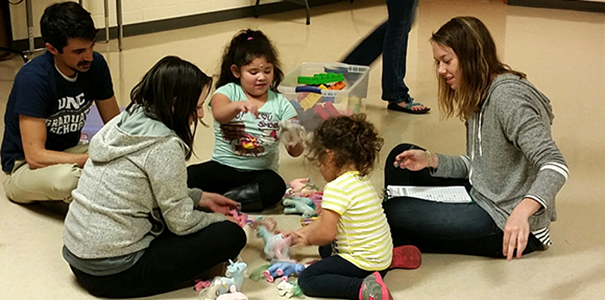Speech-Language Pathology Awarded Grant to Support Migrant and Immigrant Families

May 6, 2019
The University of Northern Colorado’s Speech-Language Pathology (SLP) Program has been awarded $36,000 in funding from the Buell Foundation to expand their work in partnering with the Migrant Education Program’s Project Literacy for Immigrant Families Everyday (L.I.F.E.).
Project L.I.F.E. is designed to provide evidence-based, literacy and oral-language enrichment to migrant and immigrant preschoolers, and, at the same time, build family literacy and parental self-efficacy to positively impact children's school readiness. Through this community-engaged program, Speech-Language Pathology graduate students have the opportunity to learn important family coaching and direct early intervention techniques in the community.
“Project L.I.F.E. allows us to positively impact our Greeley community through a mutually beneficial partnership with the MEP while supporting our students’ learning and real-life problem solving in the community,” said Kim Murza, Ph.D., UNC associate professor and graduate coordinator of the Speech-Language Pathology program.
The program includes planned group activities through bilingual book reading, emergent writing and fine motor and craft sessions to enhance literacy development. With the support from the Buell Foundation, UNC will be able to add a parent-coaching component through the Greeley Treasure Chest initiative as well as home visits.
Graduate students will provide direct programming at the UNC Speech-Language and Audiology Clinic as well as at Salida del Sol Academy and the homes of families unable to travel. About 30 families are expected to participate in this project so far.
“Ethnic, cultural and language diversity continues to enrich our region, particularly in Greeley and Fort Morgan where newcomer and refugee families relocate in search of agricultural-related work,” said Mary Good, director of the Centennial Board of Cooperative Educational Services’ Migrant Education Program. “The trends and demographic shifts of the past three years have continued with many of our newest migrant families arriving from Central and South America, Africa and Asia where they speak more than a dozen different languages.”
Many of the migrant and refugee parents never attended school, and primary home languages of the newcomers include Spanish, Somali, Tigrinya, Congolese, Burmese, Karenni, Karen and Rohingya, said Good.
Regional data show a need for ongoing support for migrant students in reading, writing, math and English Language development. Reading is the highest priority across all grade levels, and the Centennial Board of Cooperative Educational Services’ Migrant Education Program aligns their work with state performance goals across three areas: school readiness, reading and parent engagement.
The funding will last through spring 2020 with hopes to continue funding in order to support Project L.I.F.E.
More about Project L.I.F.E.: Project L.I.F.E. was developed through a collaboration between UNC’s SLP Program and the CBOCES Migrant Education Program. The goal is to deliver parent coaching to migrant families through home visits, summer L.I.F.E. kick-off programs and fall and spring L.I.F.E. programs to increase the frequency and complexity of parent-child interactions and intentional communication acts to support child-language development and emergent literacy skills.
- Learn more about UNC’s Speech-Language Pathology Program.
- Learn more about the Migrant Education Program (MEP).

